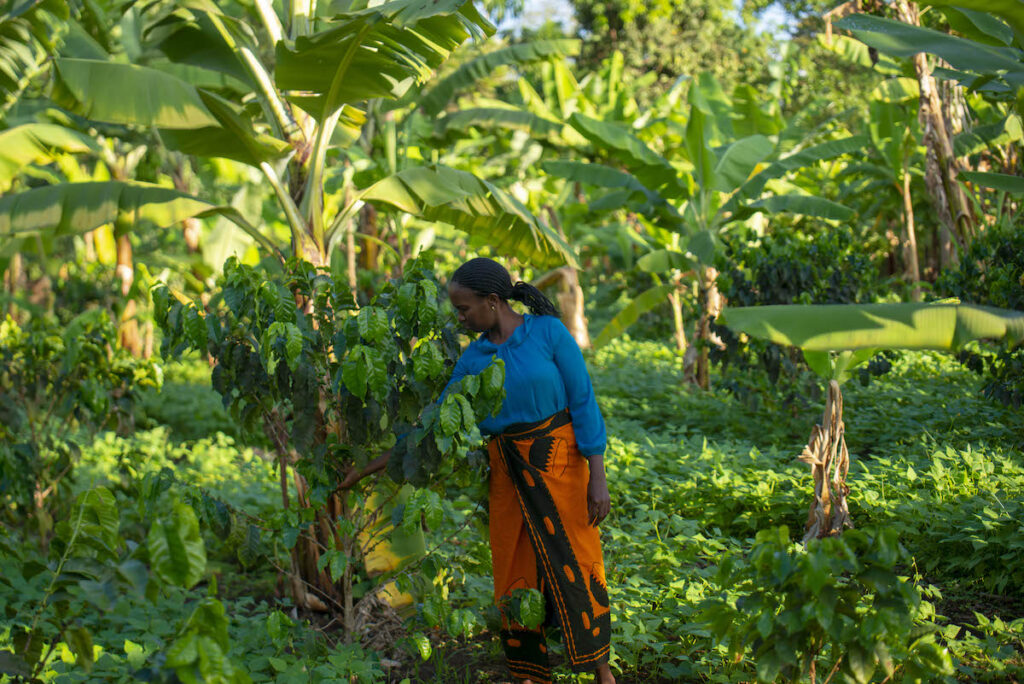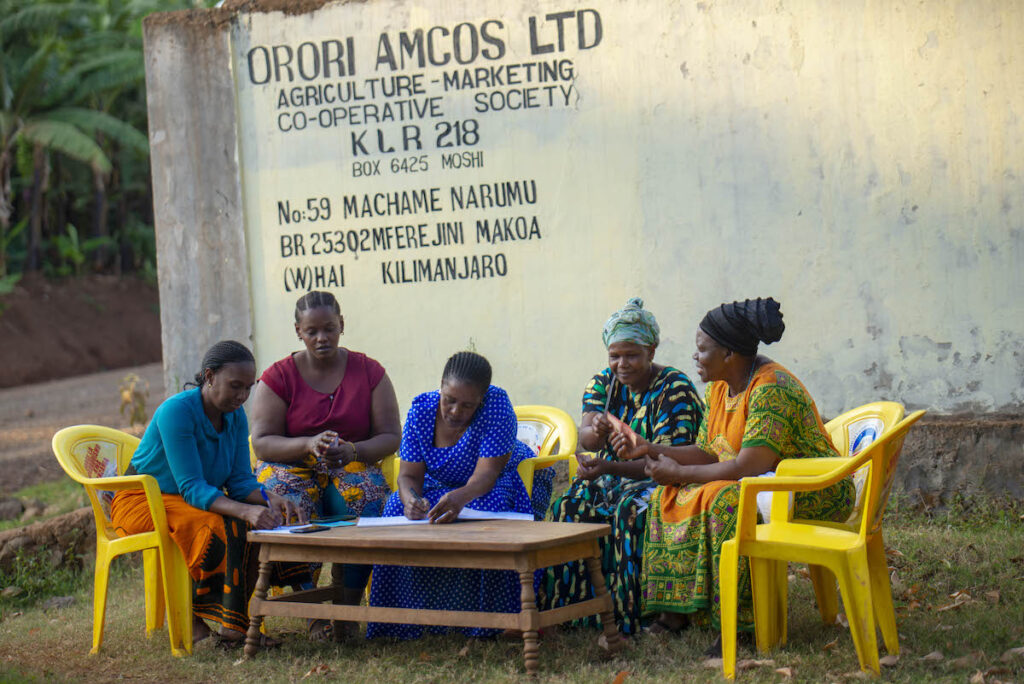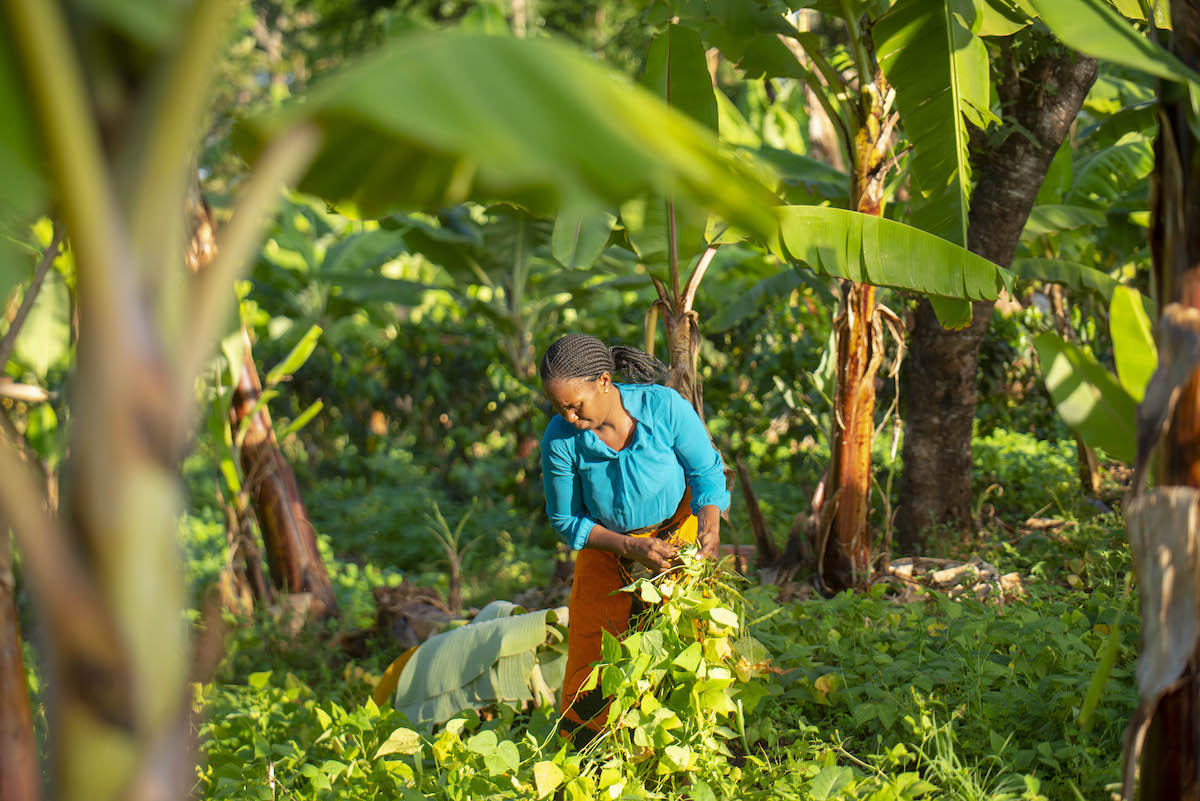Suzan Malya and her thriving coffee farm.
Suzan Malya first ventured into coffee farming as a business in 2020 when she inherited a one-acre farm from her father. At the time, the farm had approximately 357 coffee bushes – originally planted in the 1970s – that were now old and unproductive. She learned quickly that her prized inheritance was not as valuable as she had initially thought.
“In 2020, my farm’s production was a small 446 kilograms of cherry – approximately 1.25 kilograms per bush. The income from the farm was also low, and could barely meet my family’s day-to-day needs,” she said.
Coffee farming in rural Tanzania
It is unusual for a woman in Tanzania to inherit land, which is a capital-intensive resource that many smallholder farmers struggle to acquire. Yet, owning land was not enough for Suzan to establish a productive and profitable farming business. Like other farmers in East Africa, she lacked the technical knowledge for implementing good agricultural practices.
“I was managing my coffee farm without the necessary knowledge and skills. All of my production activities—the coffee varieties, farm spacing, pruning, mulching, grafting, and pest and disease management were largely inherited from, or informed by what I had learned from my father over the years,” Suzan said.
Her farming business changed in mid-2020 when she was introduced to the Solidaridad Practice for Change: Coffee Resilience programme in East Africa (PfC Coffee). Funded by the Ministry of Foreign Affairs of the Netherlands between 2018 and 2022, and created in partnership with Solidaridad Eastern and Central Africa, the PfC Coffee programme trained over 15,000 farmers in Tanzania.
Suzan was among the many farmers who learned good practices from PfC Coffee for managing a coffee farm, along with practical skills which included, canopy management, pruning, pest and disease management, fertilizer and manure application, climate-smart farming, coffee picking, and how to create and apply biochar.
Knowledge of modern coffee farming practices and access to affordable credit has put my coffee business on a path to success.
Suzan Malya
Suzan says that in her region of Tanzania, “The Hai district is characterized by mountain topography and our farms are prone to soil erosion. Learning how to manage my farm’s soil fertility, manure and fertilizer application and water conservation techniques has been a game changer for me.
“In addition, I have acquired knowledge on improved coffee varieties, and voluntarily made a decision to transition to ‘Compact’, an improved variety from Tanzania Coffee Research Institute (TaCRI).”
Over the course of the project, PfC Coffee worked with the Tanzania Coffee Research Institute (TaCRI) to use a three-tiered approach to bring knowledge and practical skills to local coffee farming communities. Under this model, knowledge flows in a cascade from experts to trainers of trainers and finally to promoter/lead farmers, like Suzan.

In total, PfC Coffee trained 91 promoter/lead farmers between 2018 and 2022. The promoter/lead farmers received training from TaCRI experts and with support from Solidaridad they went on to build the capacity of over 15,000 other farmers in Tanzania’s Hai, Sanya Juu, Siha, Meru and Rombo districts in the Kilimanjaro and Arusha regions.
The profound impact of expert training
“In 2020, I was selected as a lead farmer and trained by TaCRI experts, who took us through practical demonstrations on climate-smart practices, manure and fertilizer application, pruning, mulching and biochar making and application. This training was an eye opening experience for me”
Armed with new knowledge and skills, Suzan set out to transform her family’s coffee farm into a sustainable and profitable business. She cut down 70 of her older coffee bushes and planted seedlings of a disease resistant coffee varietal.
Since 2020, she has added a total of 200 new Compact variety seedlings bringing the total number of her coffee bushes to 487 – ‘Compact’, ‘Bourbon’ and ‘Kent’ varieties. In addition to embarking on a farm renovation journey, she has also embraced the good agricultural practices she learned from TaCRI, Solidaridad and other lead farmers.
“In 2022, my farm’s production increased by 35 percent, reaching 1,704 kilos of cherry, which is up from 1,217 kilos of cherry in 2021.”

After becoming a lead farmer, Suzan trained coffee farmers in Narumu, Orori and Hai villages. In total, she supported 77 farmers as they acquired and adopted knowledge and skills on good agricultural practices through practical demonstrations.
Suzan has also received gender training through Solidaridad, which she credits for empowering her and other women in her community with financial literacy and business management skills. Following this additional training, she joined a Nia Women’s Group (“Nia” is Swahili for “Intention”), a village savings and lending association.
Being a member of a savings or lending group has enabled me to access loans for investments into my coffee business and household needs. Access to loans means that I can afford farming inputs and pay for labor during picking season.
Suzan Malya
Her life, she notes, is on an upward trajectory. In 2021, she borrowed from the Nia group to invest in a three-acre maize farm. While producing food for household consumption, the maize farm also earns her a secondary income. In the 2021 season, she sold over 600 kgs of maize and is proudly building a family inheritance to benefit her two children.
‘‘I used the income from farming maize to repay my VSLA loan while also paying for my children’s school expenses—fees, uniform and books,” Suzan said. “I have also established a kiosk, a small retail shop. The shop provides me with regular income to cater to my household needs such as electricity and water bills.’’
Suzan’s success as a coffee farmer and budding entrepreneur is an inspiration to her friends and children. At Solidaridad, we work to support women around the world in their efforts to build legacies for their families, their communities, and themselves.

